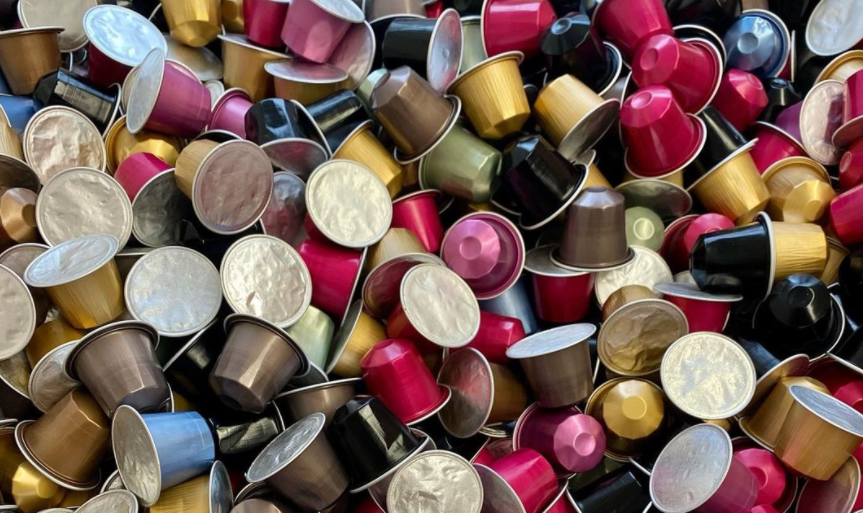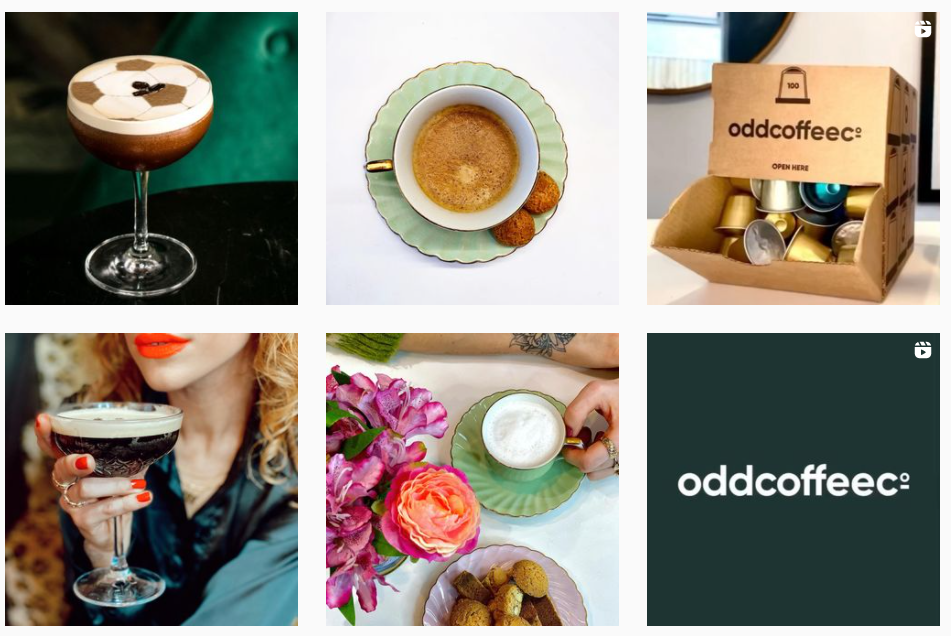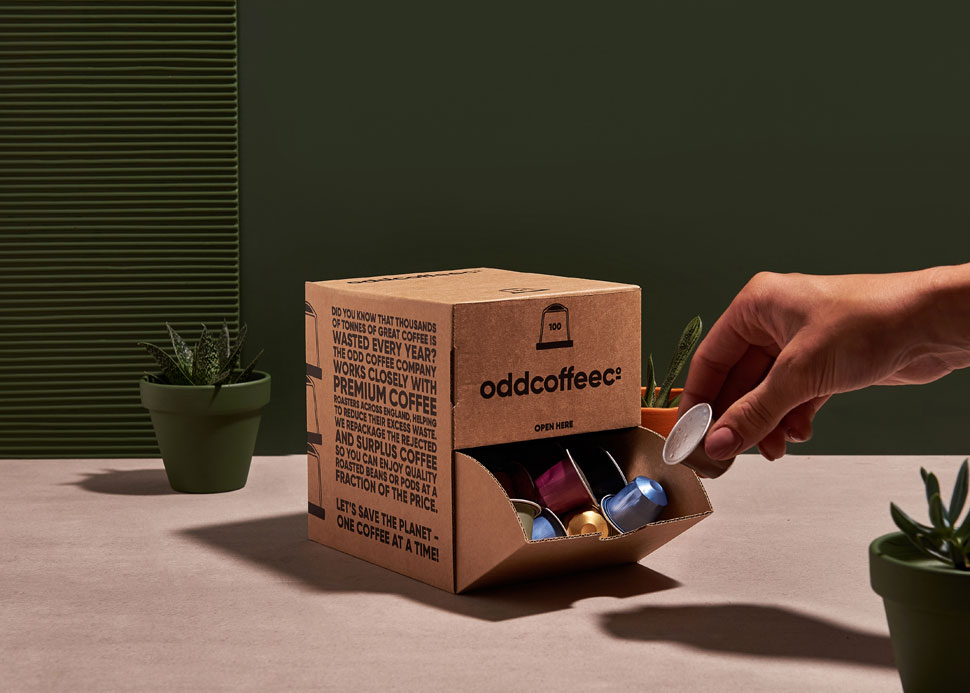Q&A with the Odd Coffee Company

Why did you found The Odd Coffee Company?
We have joined forces to tackle the excess waste in the coffee industry. Naturally, it all started with our love for coffee – neither of us can function without several coffees in the morning, so it’s a real necessity in our lives which has also turned into a passion.
The idea for the company began during the first lockdown in 2020 – when most consumer goods were extremely hard to purchase, the queues for the supermarkets became unbearable and shelves were cleared of products. Consumers turned to alternative options to ensure they had their essentials, including us and our coffee.
During our research, we started to learn about the amount of waste in the coffee industry – thousands of tonnes of coffee pods are discarded each year, despite only having minor imperfections that don’t impact the quality or taste.
In terms of the beans, the wastage is often caused due to suppliers roasting more beans than needed in case there are any complications in the roast. For example, if a mid-sized coffee roaster needs to supply a retail outlet with 100 bags of coffee, the business will roast enough beans for 110 bags.
Then, whatever is left, traditionally went to waste – but the mission of the Odd Coffee Company is to purchase the surplus from the roaster for a fair price, repackage it, then sell it for a fraction of the normal price.
Not only was this a gap in the market and an excellent business opportunity, but we could also step in to make a change and improve the sustainability of the industry.

What did the major coffee producers say when you first approached them?
Everyone’s been really open to our proposition, as our business model contributes to environmental strategies and zero waste goals.
Our relationship with the coffee producers is built on trust. We really appreciate their willingness to work with us and create these long-term partnerships that are beneficial for all.
How important is the sustainability angle?
Sustainability is a huge focus for the business. The coffee we get is from all over the world – it’s been picked, passed through Fair Trade and goes through all the compliance tests - and we’re trying to intervene before the final stage and stop some of this great coffee unnecessarily heading to landfill.
All of the pods we use are infinitely recyclable – they’re made from 100% aluminium and it’s one of the most recyclable products that ends up being thrown out in household waste.
We do recognise that there are more sustainable ways to drink coffee than from a pod, however the convenience of a coffee pod for consumers is a growing trend and is something that isn’t going to disappear soon.
Therefore, we want to provide consumers with a more sustainable way of drinking pods and act as a tool for them to reduce their carbon footprint. On our packaging, it says: please recycle, upcycle and ride your bicycle. We want people to recycle the packaging, upcycle the boxes or the coffee, and ride their bicycle to reduce their carbon footprint in general.
We’ve also made the conscious decision that we will not work with a company that uses plastic pods and we deliberately haven’t joined teracycle schemes in the UK because consumers have to drive or travel to a specific place that accepts teracycle products which adds further coffee miles - this in turn compounds the situation and counteracts the overall aim of business.”
What's the business model?
This is predominantly a B2C business and will be putting more emphasis on our subscription model moving forward. We already have a huge customer retention rate and are now turning our attention to impactful marketing strategies to continue growing that.”

How do you market the coffee?
Instagram plays a big part in our marketing strategy to attract new customers – we’ve built up a decent following over the last couple of months on this social platform.
We have such a high customer retention rate, it seems that people are really buying into our brand.
Facebook ads is another part of our marketing toolkit, and we’ve strategically used a designated budget to reach a wider sphere of people.
We believe we’ve seen great interest, aside from the sustainability factors, as our company offers an easy way for people to enjoy fancier coffees for less, as they may not be able afford or want to pay for the fancy branded coffee.
Due to the nature of our business model, we can’t always give an accurate description of the type of coffee and which coffee pod our customers may receive but it’s always going to be a decent product because of the suppliers we work with – and some people say the mystery adds to the excitement!”
What did you spend on the website and branding?
At the start of developing the business, we relied on friends and contacts we know to help with the branding and the website – and we still do that now.
In the infancy of a business, start-ups should try doing everything themselves and attempt every part of the business that they can to work out where their strengths are, but crucially, where they aren’t.
Start-ups are also generally quite lean and agile businesses, providing you with the opportunity to test different methods and see what’s right for you.
When we started the Odd Coffee Company, we quickly worked out the key areas where we’re going to need specialist help and we’re at the point now where we’re hiring the experts in these fields to elevate our business to the next level.
For instance, we initially took images of our products ourselves and whilst it was enough to get us started, they weren’t hitting the mark. Photos are part of our branding and something that we think is worth spending money on – so we’ve hired professionals to help us with this.”
How easy is it to get a license to be Nespresso compatible for the pods?
Nespresso designed and created the pods, but its patent ran out about 10 years ago, so every coffee roaster can now produce their own too.

What has been the most difficult part of developing The Odd Coffee Company?
The complex operation of the business itself was difficult to get right at the start – a lot of work went on behind the scenes to ensure we had finalised all aspects of this. We made the decision not to go forward with any marketing or a full launch until the operation was running effectively.
So many people drink coffee so it’s been imperative for us to ensure we’re portraying consistent and accurate messaging and making the business model easy to understand for consumers.
We’re also increasing our fulfilment in the next few weeks, meaning we will be able to take more orders and sell more product.”
Are you looking for funding to expand?
We are trialling a new marketing plan for the next six months before we look to raise capital. We have worked hard to establish the business so far and are now looking at driving the business forward even more – we would like to approach an investor with a robust strategy.
What's the long-term plan?
We’d like to be one of the biggest names in coffee and shout about our credentials as a one premium coffee company using surplus coffee. With the right funding and marketing techniques, we can absolutely make our mark like some of the other brands have.
We’ve already rescued over one million pods and nine tonnes of coffee, but we’d like to hit the target of rescuing 100 tonnes by next year.
Ultimately, we want to be partnering with every coffee producer in the UK to help them battle waste. These brands are less sustainable without us, especially with today’s green agenda that every brand should play an active role to reduce its waste.
We want to give everyone good quality coffee that doesn’t cost the earth – both in terms of the cost for the consumer and one that isn't environmentally detrimental to the planet.
In terms of our sales, we want to have expanded ten-fold by this time next year and we think it’s achievable with the right investment and strategy.
(2).jpg)
.jpeg)
.jpeg)